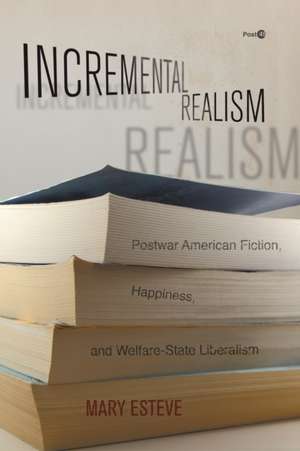Incremental Realism – Postwar American Fiction, Happiness, and Welfare–State Liberalism: Post*45
Autor Mary Esteveen Limba Engleză Hardback – 18 ian 2021
Esteve specifically focuses on era-defining authors of realist fiction, including Philip Roth, Gwendolyn Brooks, Patricia Highsmith, Paula Fox, Peter Taylor, and Mary McCarthy, who mobilized the trope of happiness to reinforce the crucial value of public institutions, such as the public library, and the importance of pursuing socioeconomic justice, as envisioned by the United Nations Universal Declaration of Human Rights and welfare-state liberals. In addition to embracing specific symbols of happiness, these writers also developed narrative modes--what Esteve calls "incremental realism"--that made justifiable the claims of disadvantaged Americans on the nation-state and promoted a small-canvas aesthetics of moderation. With this powerful demonstration of the way postwar literary fiction linked the era's familiar trope of happiness to political arguments about socioeconomic fairness and individual flourishing, Esteve enlarges our sense of the postwar liberal imagination and its attentiveness to better, possible worlds.
| Toate formatele și edițiile | Preț | Express |
|---|---|---|
| Paperback (1) | 261.72 lei 6-8 săpt. | |
| MK – Stanford University Press – 18 ian 2021 | 261.72 lei 6-8 săpt. | |
| Hardback (1) | 776.76 lei 6-8 săpt. | |
| MK – Stanford University Press – 18 ian 2021 | 776.76 lei 6-8 săpt. |
Din seria Post*45
-
 Preț: 177.64 lei
Preț: 177.64 lei -
 Preț: 279.88 lei
Preț: 279.88 lei -
 Preț: 228.82 lei
Preț: 228.82 lei -
 Preț: 201.29 lei
Preț: 201.29 lei -
 Preț: 223.09 lei
Preț: 223.09 lei -
 Preț: 616.84 lei
Preț: 616.84 lei -
 Preț: 199.71 lei
Preț: 199.71 lei -
 Preț: 231.50 lei
Preț: 231.50 lei -
 Preț: 199.71 lei
Preț: 199.71 lei -
 Preț: 131.11 lei
Preț: 131.11 lei -
 Preț: 230.13 lei
Preț: 230.13 lei -
 Preț: 200.97 lei
Preț: 200.97 lei -
 Preț: 159.22 lei
Preț: 159.22 lei -
 Preț: 216.26 lei
Preț: 216.26 lei -
 Preț: 217.79 lei
Preț: 217.79 lei -
 Preț: 155.89 lei
Preț: 155.89 lei -
 Preț: 263.63 lei
Preț: 263.63 lei -
 Preț: 460.47 lei
Preț: 460.47 lei - 19%
 Preț: 645.19 lei
Preț: 645.19 lei -
 Preț: 479.18 lei
Preț: 479.18 lei - 19%
 Preț: 448.67 lei
Preț: 448.67 lei -
 Preț: 260.76 lei
Preț: 260.76 lei -
 Preț: 212.07 lei
Preț: 212.07 lei -
 Preț: 266.52 lei
Preț: 266.52 lei -
 Preț: 261.72 lei
Preț: 261.72 lei -
 Preț: 261.72 lei
Preț: 261.72 lei -
 Preț: 266.52 lei
Preț: 266.52 lei - 19%
 Preț: 705.10 lei
Preț: 705.10 lei
Preț: 776.76 lei
Preț vechi: 1008.78 lei
-23% Nou
Puncte Express: 1165
Preț estimativ în valută:
148.66€ • 154.79$ • 125.63£
148.66€ • 154.79$ • 125.63£
Carte tipărită la comandă
Livrare economică 11-25 martie
Preluare comenzi: 021 569.72.76
Specificații
ISBN-13: 9781503613942
ISBN-10: 1503613941
Pagini: 296
Dimensiuni: 161 x 236 x 23 mm
Greutate: 0.52 kg
Editura: MK – Stanford University Press
Seria Post*45
ISBN-10: 1503613941
Pagini: 296
Dimensiuni: 161 x 236 x 23 mm
Greutate: 0.52 kg
Editura: MK – Stanford University Press
Seria Post*45
Cuprins
Introduction: The Symbolic Economy of Postwar American Happiness
1. The Art, Sociology, and Library Politics of Happiness in Early Philip Roth
2. Gwendolyn Brooks and the Welfare State
3. Queer Consumerism, Straight Happiness: Patricia Highsmith's "Right Economy"
4. Countries of Health
5. Writing Mute Liberalism: Peter Taylor, the South, and Journeyman Happiness
Coda: The Politics of Contemporary Happiness
1. The Art, Sociology, and Library Politics of Happiness in Early Philip Roth
2. Gwendolyn Brooks and the Welfare State
3. Queer Consumerism, Straight Happiness: Patricia Highsmith's "Right Economy"
4. Countries of Health
5. Writing Mute Liberalism: Peter Taylor, the South, and Journeyman Happiness
Coda: The Politics of Contemporary Happiness
Notă biografică
Mary Esteve is Associate Professor of English at Concordia University in Montreal. She is the author of The Aesthetics and Politics of the Crowd in American Literature (2003).
Descriere
Descriere de la o altă ediție sau format:
"This book offers a revisionist literary and cultural history of the postwar era to document how writers of realist fiction worked to advance the crucial value of public institutions and ongoing pursuits of socioeconomic justice within the symbolic economy of welfare-state liberalism"--
"This book offers a revisionist literary and cultural history of the postwar era to document how writers of realist fiction worked to advance the crucial value of public institutions and ongoing pursuits of socioeconomic justice within the symbolic economy of welfare-state liberalism"--
